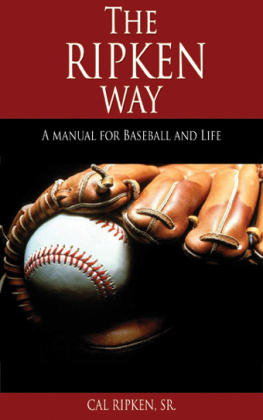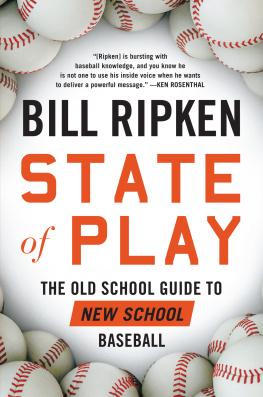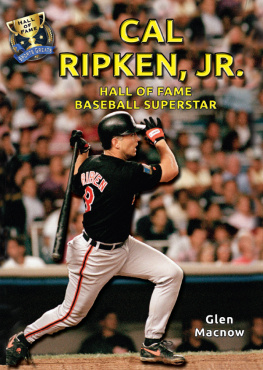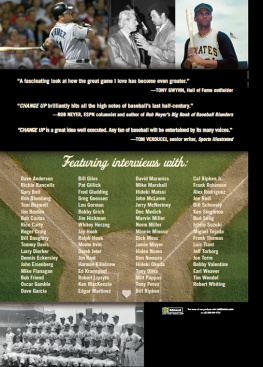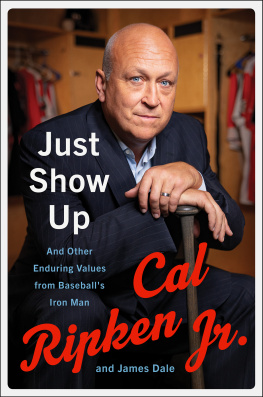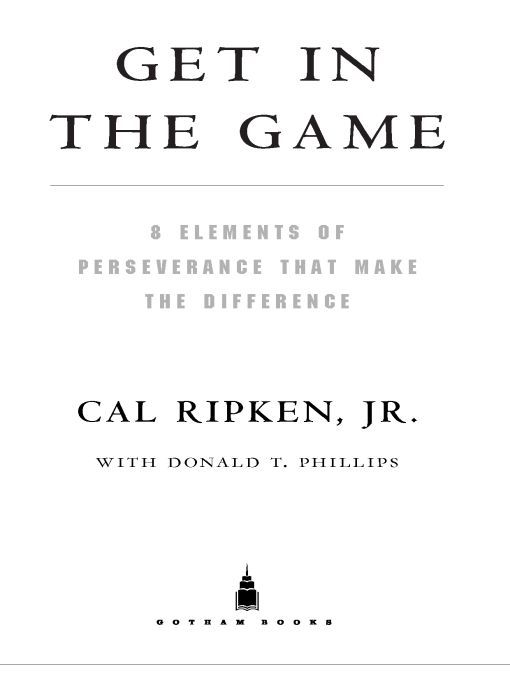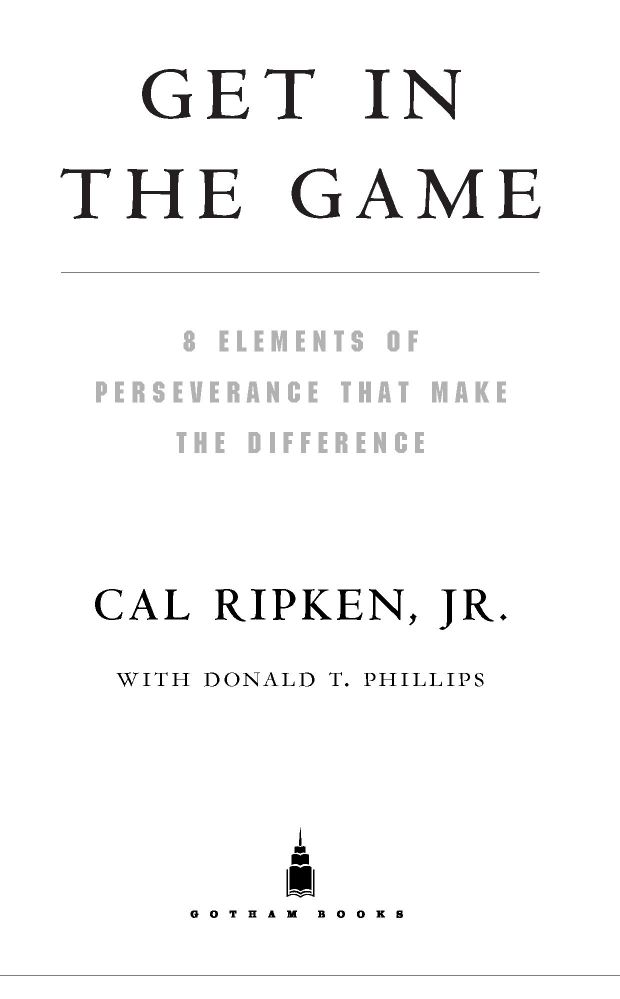Table of Contents
Praise for Cal Ripken, Jr., andGet in the Game:
Cal Ripken, Jr., set the standard for hard work, dependability, and dedication on the playing field. In Get in the Game, he describes eight principles that enabled his record-breaking consecutive games streak and helped him to excel throughout his career. Whether you seek athletic, professional, or personal excellence, Cal will inspire you to persevere. President William Jefferson Clinton
Cal Ripken, a genuine national hero, has written a book that will inspire many young people. He talks about sound values as they apply to sports and to life itself. President George H. W. Bush
Every boyeven at age seventy-sixneeds some heroes. Cal Ripken, Jr., is one of mine. When you read this book youll know why. Warren E. Buffett, chairman of Berkshire Hathaway
Get in the Game teaches us how to be our best.... a lesson in perseverance from Cal Ripken, Jr., is similar to a piano lesson from Mozart. Dont miss it! former senator Bill Bradley
Cal Ripken, Jr., is an athlete whose words match his deeds, and what he says about perseverance in Get in the Game is wise advice, whatever game youre in. Frank Deford
A great book.... Ripken takes the reader from the field to the board-room. Brian Kilmeade, author of the New York Times bestseller The Games Do Count
For anyone looking to get ahead in life, this book is a great motivational tool. Cal Ripken brings together the basic principles of success and provides readers with insight on how they have helped him succeed in baseball, business, and life.
David Bach, bestselling author of The Automatic Millionaire and Start Late, Finish Rich
A well-written combination autobiography and inspirational self-help book.... The essential message... is illuminating even to those who arent baseball fans. Publishers Weekly
In a world where genuinely admirable men and women are in short supply, Cal Ripken, Jr., is clearly and indisputably one of them. If youre still not convinced, read this book.
The Washington Post Book World
Praise for Cal Ripken, Jr.s Previous Books:
Few opinions on the gameon, off, and around the fieldmatter more than those of Ripken. The Sun (Baltimore)
Cal Ripken provides one of the best reasons for even the most jaded fan to keep on rooting. The New York Times Book Review
Cal Ripken, Jr., baseballs Iron Man, broke Lou Gehrigs legendary consecutive games streak by playing in his 2,131st straight game on September 6, 1995. He voluntarily ended the streak in 1998 with 2,632 consecutive games after having not missed a day of work in seventeen years. In twenty-one seasons with the Baltimore Orioles, Ripken amassed more than 3,000 hits and 400 home runsone of only eight players in the history of Major League Baseball to do so. He was named Rookie of the Year in 1982, voted Most Valuable Player twice (1983, 1991), and played in nineteen All Star games (twice named game MVP: in 1991 and 2001). As a big man (6 4, 225 pounds), he is credited with redefining the position of shortstop and paving the way for such great players as Alex Rodriguez and Derek Jeter. Since retiring from baseball, Cal Ripken, Jr., has made a successful transition from athlete to businessman. He is currently president and CEO of the Ripken Baseball Group (www.RipkenBaseball.com), which is comprised of: minor league teams the Aberdeen IronBirds and the Augusta Green Jackets; the Ironclad Authentics company; Ripken Amateur Baseball; and the Cal Ripken, Sr., Foundation. Ripken is also a highly sought after speaker and a bestselling author. His previous books include The Only Way I Know, Play Baseball The Ripken Way, and Parenting Young Athletes The Ripken Way.
Donald T. Phillips is the bestselling author of eighteen books, including Lincoln on Leadership and On the Wing of Speed. He has also collaborated on books with Mike Krzyzewski (Coach K of Duke University), Phil Mickelson, Rudy Ruettiger, and Greg Norman.
The Ripken Leadership Center has been formed as a partnership between Cal Ripken, Jr., and Donald Phillips as a resource site for ongoing business, life, and leadership insights and information, including a regular e-mail newsletter. Visit www.RipkenLeadership.com to learn more.
PREFACE
Lou Gehrig and I shared a connection that goes back to old-school
values and principles about going to work every day and hanging
in there when the going gets tough. Its the basic belief of simply
rolling up your sleeves and doing the job to the best of your ability. Ideals
such as these harken back to a time when baseball was just a game.
I remember being on the top step of the dugout with a bunch of other shortstops back at the 1998 All-Star game at Coors Field in Denver. Alex Rodriguez, Derek Jeter, Omar Vizquel, Damion Easley, and I were watching the home-run-hitting contest when Derek began asking me questions.
Derek Jeter was the starting shortstop for the New York Yankees. Hed been drafted out of high school in 1992, spent several years in the minor leagues, and had finally been called up to the majors in 1996. In his first full season, he had batted .314 and was named Rookie of the Year in the American League. Hed had another excellent year in 1997, and after starting 1998 like gangbusters, he had been selected for the All-Star summer classic.
You could have taken these basic facts about Dereks early career, erased his name, and inserted mine. Its almost exactly the same thing that happened to me. When I was voted into my first few All-Star games, I used them as wonderful learning opportunities, because I was with some of the games best veteran ballplayers. So I hung around them, asked all kinds of questions, and listened to what they had to say. But in 1998, the shoe was on the other foot. Derek Jeter was twenty-four years old and appearing in his first All-Star game. I was almost thirty-eight and participating in my sixteenth summer classic. He was the kid and I was the veteran from whom he wanted to learn.
How do you make only three errors in an entire season? was the first question Derek asked me. We chatted for a few minutes about that oneabout fielding, preparation, anticipation, and luck. And then Derek posed a question for which I didnt really have an answer:
Whats the secret of playing every day? How do you do it?
I paused for a moment, then said, You know, Derek, I just... I just play.
I can still remember the look on his face. It wasnt one of total disappointment. Rather, it was more of a puzzled look. I giggled a little bit and thought to myself that he either believed I didnt want to share my secret, or thought I wasnt very smart. Either way, Im sure Derek expected me to give him a definitive answer: This is what you have to doa, b, and c. But at that point in my career, I couldnt really answer his question in such specific termseven though others had asked me the same thing many times before.
Two and a half years earlier, on September 6, 1995, I had broken the major league baseball record for consecutive games played. On that day, Id played in my 2,131st straight ball game, and up to the 1998 All-Star game, I had still not missed a single day of work. My streak would eventually end later that year, on September 20, 1998, after I had played in 2,632 consecutive games.


